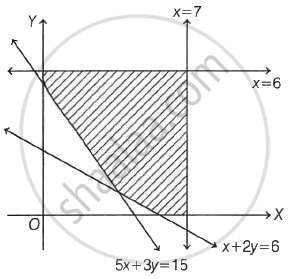Advertisements
Advertisements
Question
A company manufactures two models of voltage stabilizers viz., ordinary and auto-cut. All components of the stabilizers are purchased from outside sources, assembly and testing is carried out at the company’s own works. The assembly and testing time required for the two models are 0.8 hours each for ordinary and 1.20 hours each for auto-cut. Manufacturing capacity 720 hours at present is available per week. The market for the two models has been surveyed which suggests a maximum weekly sale of 600 units of ordinary and 400 units of auto-cut. Profit per unit for ordinary and auto-cut models has been estimated at ₹ 100 and ₹ 150 respectively. Formulate the linear programming problem.
Solution
(i) Variables: Let x1 and x2 denote the number of ordinary and auto-cut voltage stabilized.
(ii) Objective function:
Profit on x1 units of ordinary stabilizers = 100x1
Profit on x2 units of auto-cut stabilized = 150x2
Total profit = 100x1 + 150x2
Let Z = 100x1 + 150x2, which is the objective function.
Since the profit is to be maximized. We have to Maximize, Z = 100x1 + 15x2
(iii) Constraints: The assembling and testing time required for x1 units of ordinary stabilizers = 0.8x1 and for x2 units of auto-cut stabilizers = 1.2x2
Since the manufacturing capacity is 720 hours per week.
We get 0.8x1 + 1.2x2 ≤ 720
Maximum weekly sale of ordinary stabilizer is 600 i.e., x1 ≤ 600
Maximum weekly sales of auto-cut stabilizer is 400 i.e., x2 ≤ 400
(iv) Non-negative restrictions: Since the number of both the types of stabilizers is non-negative, we get x1, x2 ≥ 0.
Thus, the mathematical formulation of the LPP is, Maximize Z = 100x2 + 150x2
Subject to the constraints
0.8x1 + 1.2x2 ≤ 720, x1 ≤ 600, x2 ≤ 400, x1, x2 ≥ 0
APPEARS IN
RELATED QUESTIONS
Find the feasible solution of the following inequation:
3x + 4y ≥ 12, 4x + 7y ≤ 28, y ≥ 1, x ≥ 0.
Find the feasible solution of the following inequation:
x + 4y ≤ 24, 3x + y ≤ 21, x + y ≤ 9, x ≥ 0, y ≥ 0.
The company makes concrete bricks made up of cement and sand. The weight of a concrete brick has to be at least 5 kg. Cement costs ₹ 20 per kg and sand costs of ₹ 6 per kg. Strength consideration dictates that a concrete brick should contain minimum 4 kg of cement and not more than 2 kg of sand. Form the L.P.P. for the cost to be minimum.
Solve the following LPP:
Maximize z =60x + 50y subject to
x + 2y ≤ 40, 3x + 2y ≤ 60, x ≥ 0, y ≥ 0.
In a cattle breeding firm, it is prescribed that the food ration for one animal must contain 14, 22, and 1 unit of nutrients A, B, and C respectively. Two different kinds of fodder are available. Each unit weight of these two contains the following amounts of these three nutrients:
| Nutrient\Fodder | Fodder 1 | Fodder2 |
| Nutrient A | 2 | 1 |
| Nutrient B | 2 | 3 |
| Nutrient C | 1 | 1 |
The cost of fodder 1 is ₹ 3 per unit and that of fodder ₹ 2 per unit. Formulate the L.P.P. to minimize the cost.
Choose the correct alternative :
Which of the following is correct?
Maximize z = 7x + 11y subject to 3x + 5y ≤ 26, 5x + 3y ≤ 30, x ≥ 0, y ≥ 0
Choose the correct alternative:
Z = 9x + 13y subjected to constraints 2x + 3y ≤ 18, 2x + y ≤ 10, 0 ≤ x, y was found to be maximum at the point
The minimum value of z = 5x + 13y subject to constraints 2x + 3y ≤ 18, x + y ≥ 10, x ≥ 0, y ≥ 2 is ______
For the following shaded region, the linear constraint are:

